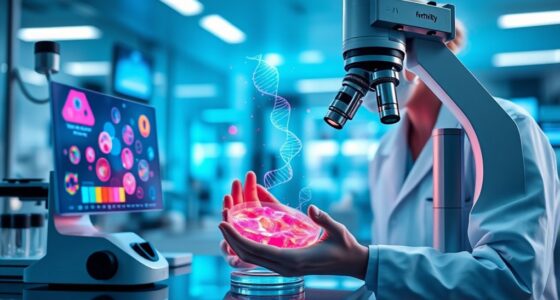In our pursuit to uncover the secrets of drug development, we have seen a significant breakthrough. Machine learning, with its impressive capacity to analyze large quantities of data, has become a valuable tool in our arsenal.
This comprehensive guide explores the impact of machine learning on drug discovery, from enhancing target identification to optimizing clinical trial design. Join us as we delve into the depths of this technological marvel, revolutionizing the way we develop life-saving medications.
Key Takeaways
- Machine learning enhances drug target identification and design by analyzing data and identifying patterns.
- Machine learning improves compound screening and selection by analyzing high throughput screening data and guiding compound design.
- Machine learning accelerates drug repurposing by analyzing large datasets, screening existing drugs, and predicting efficacy and safety.
- Machine learning enhances personalized medicine in drug discovery by analyzing patient data, predicting treatment outcomes, and tailoring treatment regimens based on individual characteristics.
Enhancing Drug Target Identification
We have found that machine learning greatly enhances our ability to identify potential drug targets.
In the field of drug discovery, identifying suitable drug targets is crucial for the development of effective therapies. Traditional methods of drug target identification often rely on experimental and time-consuming approaches.

However, with the advent of machine learning techniques, the process has been revolutionized. Machine learning algorithms can analyze vast amounts of data and identify patterns that may be indicative of potential drug targets.
This enables researchers to prioritize targets for further investigation, leading to more efficient and effective drug target validation.
Furthermore, machine learning can also aid in target-based drug design, where the focus is on developing drugs that specifically interact with the identified targets.
Improving Compound Screening and Selection
By utilizing machine learning techniques, we can improve the process of compound screening and selection in drug discovery. Here are three ways in which machine learning is enhancing this crucial step:

- High Throughput Screening (HTS): Machine learning algorithms can analyze large volumes of data generated from HTS experiments, helping to identify potential drug candidates with higher accuracy and efficiency. This enables researchers to screen a larger number of compounds and prioritize those with the most promising properties.
- Virtual Screening: Machine learning models can be trained using data from known active compounds to predict the activity of new compounds. This allows researchers to virtually screen a vast number of compounds, significantly reducing the time and cost associated with experimental screening.
- Predictive Modeling: Machine learning algorithms can analyze diverse data sources, including chemical structures, biological activity, and physicochemical properties, to build predictive models. These models can then be used to guide compound selection and design, increasing the likelihood of finding successful drug candidates.
Improving compound screening and selection is a crucial step in the drug discovery process.
Now, let’s explore how machine learning is accelerating drug repurposing.
Accelerating Drug Repurposing
One key approach to accelerate drug repurposing is through the application of machine learning techniques.
Drug repurposing, also known as drug repositioning or drug reutilization, refers to the process of finding new therapeutic uses for existing drugs.

This approach has gained significant attention in recent years due to its potential to reduce the time and cost associated with drug development.
Machine learning algorithms can analyze large datasets, such as electronic health records, biomedical literature, and molecular databases, to identify potential drug candidates for repurposing.
These algorithms can uncover hidden patterns and relationships that may not be easily discernible through traditional methods.
By leveraging this technology, researchers can quickly screen and prioritize existing drugs for potential repurposing, saving valuable time and resources.

Furthermore, machine learning can also assist in predicting the efficacy and safety of repurposed drugs.
By integrating various data sources, including genetic information and molecular interactions, these algorithms can provide insights into potential drug-drug interactions and adverse effects, aiding in the decision-making process.
In conclusion, machine learning techniques have the potential to significantly accelerate drug repurposing efforts.
Optimizing Clinical Trial Design and Analysis
Machine learning has the potential to greatly enhance the design and analysis of clinical trials, leading to more efficient and effective drug development processes. Here are three ways in which machine learning can optimize clinical trial design and analysis:

- Adaptive trials: Machine learning algorithms can continuously analyze and learn from incoming data during a clinical trial. This enables adaptive trial designs, where treatment regimens can be modified in real-time based on the evolving patient response. This flexibility allows for more personalized and precise treatment approaches, potentially leading to improved patient outcomes.
- Biomarker-driven trials: Machine learning can help identify relevant biomarkers that can be used to stratify patients into subgroups based on their molecular profiles. By incorporating biomarker data into clinical trial design and analysis, researchers can better understand treatment response and identify patient populations that are most likely to benefit from a particular therapy.
- Predictive modeling: Machine learning algorithms can analyze large amounts of patient data, including demographics, medical history, and genetic information, to predict treatment outcomes. These predictive models can guide trial design and help identify the most promising drug candidates for further development.
Enhancing Personalized Medicine in Drug Discovery
To enhance personalized medicine in drug discovery, we can utilize data-driven approaches to tailor treatment regimens based on individual patient characteristics.
Patient stratification plays a crucial role in this process, as it involves dividing patients into distinct groups based on their specific disease subtypes, genetic profiles, or other relevant factors.
By analyzing large datasets using machine learning algorithms, we can identify patterns and biomarkers that differentiate these patient groups, allowing for more precise treatment selection.
Furthermore, data-driven approaches can also help in predicting therapeutic efficacy for different patient groups, enabling the identification of individuals who are most likely to benefit from a particular drug.

This personalized approach not only improves patient outcomes but also reduces the risk of adverse effects and unnecessary treatments, ultimately leading to more effective and efficient drug discovery processes.
Frequently Asked Questions
How Does Machine Learning Enhance Drug Target Identification?
Machine learning enhances drug target identification by utilizing advanced algorithms in drug discovery. By analyzing vast amounts of data, machine learning algorithms can predict potential drug targets, leading to more efficient and targeted drug development processes.
What Are the Benefits of Using Machine Learning in Compound Screening and Selection?
Using machine learning in compound screening and selection improves efficiency and cost savings. It allows us to analyze vast amounts of data, identify potential drug candidates more accurately, and prioritize experiments for further testing.
Can Machine Learning Accelerate the Process of Drug Repurposing?
Machine learning has the potential to accelerate drug repurposing by analyzing vast amounts of data and identifying new therapeutic uses for existing drugs. However, there are limitations and challenges in terms of data quality and regulatory approval.

How Can Machine Learning Optimize Clinical Trial Design and Analysis?
Machine learning’s impact on drug discovery extends beyond repurposing. It optimizes clinical trial design and analysis, revolutionizing the way we approach drug development. With its analytical prowess, machine learning enhances efficiency and accuracy in trial optimization.
In What Ways Does Machine Learning Enhance Personalized Medicine in Drug Discovery?
Machine learning in precision medicine and pharmacogenomics enhances personalized medicine in drug discovery. It allows for the analysis of large datasets to identify biomarkers, predict drug response, and optimize treatment plans for individual patients.
Conclusion
In conclusion, machine learning has revolutionized the field of drug discovery. It has enhanced various aspects of the process, including target identification, compound screening, drug repurposing, clinical trial design, and personalized medicine. Its advanced algorithms and predictive capabilities have significantly accelerated the development of new drugs. This has led to improved patient outcomes and saved countless lives. The profound impact of machine learning in this domain is nothing short of a groundbreaking scientific marvel. It has forever changed the landscape of pharmaceutical research.










